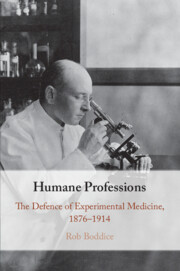‘Humane Professions is an absorbing, and vitally important, account of the response of medical scientists from 1876 to 1914 to the anti-vivisection movement's demand for legal regulation. Boddice has pulled back the curtain on the development of an internationally networked defence of experimental science for the lay public based on depicting the medical researcher as a heroic humanitarian.'
Bernard Lightman - York University
‘Humane Professions is a rich and perceptive account of experimental priorities in medical science that refuses to take for granted the stakes of scientific knowledge and its production for actors inside and outside professional circles. Boddice shows how, at its core, the story of making knowledge is a story of claiming humanness.'
Todd Meyers - McGill University
‘… a compelling account … Well-written and meticulously researched … Historians … will find Humane Professions a very valuable addition to the historiography.’
Karen Ross
Source: Social History of Medicine
'Boddice’s book is a welcome addition to the literature of the history of physiology, experimental medicine, biomedical research, and-most of all-the antivivisection movement. It provides valuable insight into a dynamic period when medical science was transformed from a largely solitary, self-funded activity into an international enterprise deemed worthy of philanthropic and government support. The book is well written.’
W. Bruce Fye
Source: Bulletin of the History of Medicine
‘Boddice’s depth of research is impressive … Humane Professions is a book that should be carefully considered by historians of medicine and biological science focused on the nineteenth and twentieth centuries’
Sarah E. Naramore
Source: Isis
‘The book is well grounded in the relevant historiography and driven by key archvies … the book is at its strongest as a cultural history tracking the origins and circulation of motifs, messages and homilies.’
Peter Hobbins
Source: Canadian Journal of Health History
‘Boddice closely and systematically reconstructs how the information network of British and American scientists was ultimately able to shift public opinion, not through dry academic research and statistics but through 'emotional labor' - the use of personal stories and sentimental experiences. Although most previous studies of the history of animal experimentation have focused on the voices of anti-vivisectionists, this book also presents the conflict from medical scientists’ point of view, allowing for a more comprehensive understanding of how the controversies originated.’
Pamela Lee
Source: Journal of Interdisciplinary History
‘This is a book written with micro-surgical precision resulting in a high efficacy … In other words, a book that transcends the boundaries of space and time.’
Alain Touwaide
Source: Doody's Reviews
‘A major strength of the book lies in its multinational perspective. … Furthermore, the book provides a good example of the ways in which biomedical scientists strive to gain political power and public support about contentious issues.’
Shira Shmuely
Source: Journal of the History of Biology
'Boddice provides a detailed account of the myriad strategies - legislative, representational, political, and rhetorical - medical professionals and biomedical researchers employed in the late nineteenth and early twentieth centuries to protect their right to use experimental animals in any manner they deemed appropriate.'
D. A. Brass
Source: Choice



